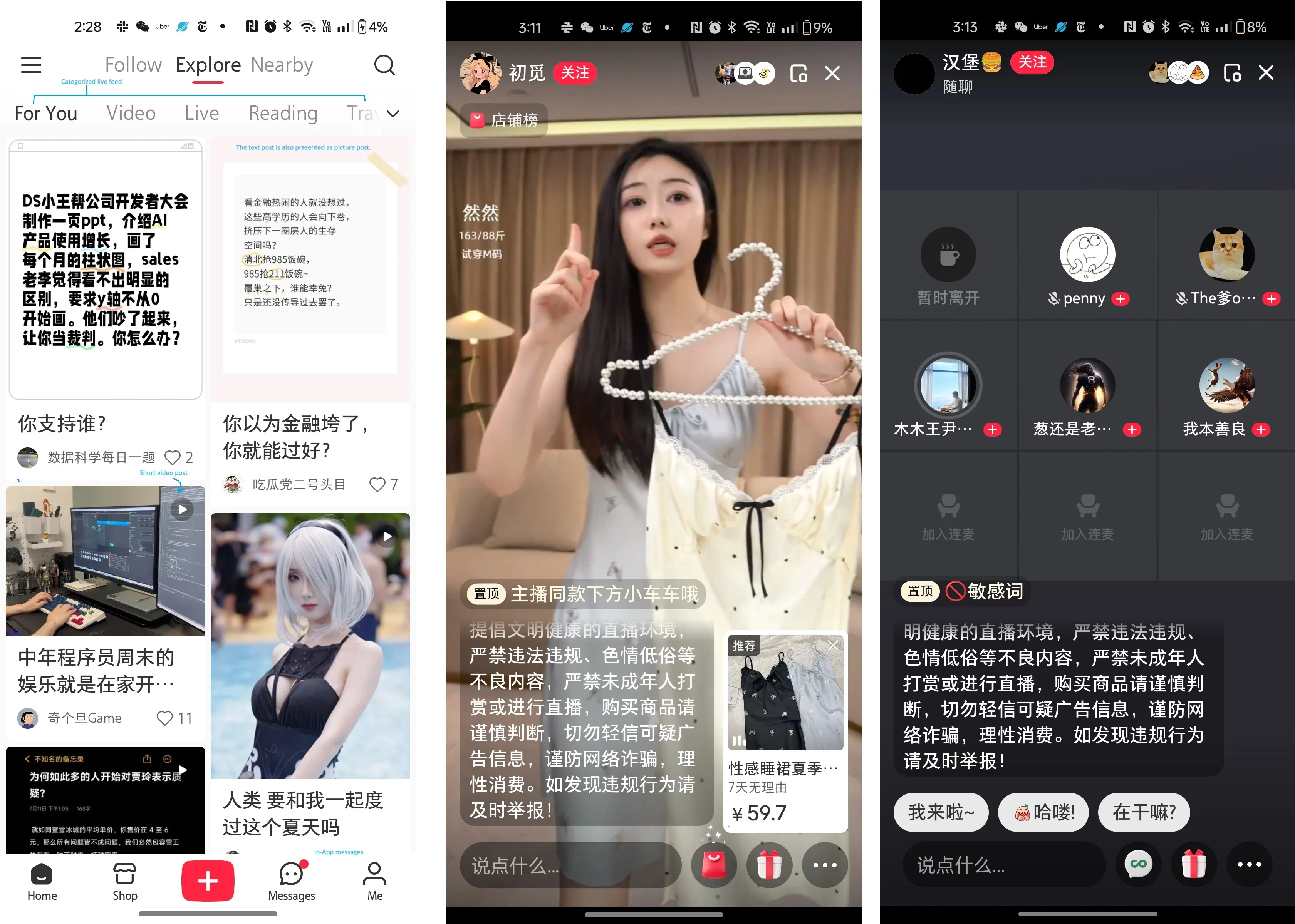The Observation of Xiaohongshu
Since Oct 2023, I have spent significant time in Xiaohongshui, a Chinese social network similar to Instagram which targets the Chinese middle class, especially professional women. Its main UI features two-column, infinite-scroll layout with curated content, see the left below.
Xiaohongshui also supports real-time interaction between users. The live commerce, a live-streaming shopping experience, diversifies Xiaohongshu’s monetization strategy and contributes 20% of its revenues. During these sessions, The host presents merchandise, usually clothing, skin care, tailored to the user profile and demonstrates the products with live models. It is common that for price to be heavily discounted thanks to the exclusive deals with manufacturers, usually in the form of limited-time deals. See the picture in the center for an example.
Another product is online chatroom, similar to clubhouse, see the right picture.
- Each room has a host to facilitate the conversation.
- The audience can leave a comment, raise the hand to speak.
- Once the host approve the request, the speaker can join the conversation.
It is worthy noting that the chatroom is a great channel to for audience engagement, but a terrible business: it is expensive to operate, we are talking about real-time communication and broadcast; and almost impossible to monetize, you cannot inject ads during the conversations. Furthermore, it carries monumental legal liability. The platform is required by the authority to monitor and censor the conversation in the near real-time fashion, see censorship for details.
I can only imagine the chatroom as a loss lead generator for other business units in th corporation.

The kaleidoscope of chat rooms
Browsing chat rooms is on Xiaohongshu is like channel surfing in the weekday afternoons. Live commerce hosts energetically brag about their products, demonstrate the effects of garment or cosmetics, and nudge the audience to place order with limited-time discount. Domain experts spread anxieties of FOMO(fear of missing out) and promoted their online courses. Among them, Li Yizhou(李一舟), a prominent figure in artificial intelligence, likely makes more money selling online courses than all other AI startup combined in China. It is always more lucrative to sell shovels during a gold rush.
Besides these professional hosts, there are chat rooms for the ordinary users. They discuss hobbies, rant about the dire job market, share the outrageous dating experiences, and seek consolation for troubled relationships. Some chat rooms are tightly knit with a relatively stable audience, building trust and growing into network neighbors.
I chatted with quite a few hosts under the name of field study, — a justification for the time sink in this social network. Many hosts considered self-publishing as a second curve, but they do not have a clear roadmap for monetization. Without business metrics, their primary focus is the engagement: the followers, views, likes, bookmarks, etc.
These KOL-to-be are industrious in the early stage, — it is not rare to spot chat rooms with over 12 hours air time. Engagement drives the traffic to their posts, hikes up the likes and bookmarks, and converts to followers. However, the return on investment(ROI) plateaus, then deteriorates over time, causing significant anxiety among the hosts. The feedback loop is opaque, the hosts have no visibility the criteria how platform distribute the traffic. I observed a few host frustrated, ambition bruised, and slowly abandoned the platform, the estimated life cycle of a chat room is roughly 3 – 6 months.
Another two factors contributing to the short life cycle of chatroom are censorship(discussed in Censorship), and malicious competition. At least two host complained about the ungrounded complaints from anonymous users, and it took multiple rounds communication with the customer support to clean their names. They also suspected their accounts were under surveillance, with less exposures to the public audience.
Censorship
Just like other social network in China, Xiaohongshu enforces strict censorship. Many of my network neighbors and I have been punished for violating the community rules by discussing something inappropriate, such as:
- Mentioning names of the leadership of China.
- Criticizing domestic economy or politics.
- Mentioning country and region names such as United State, Britain, and Hong Kong.
- Mentioning alcohol, and other substances.
- Discussion on real estate, stock markets etc.
Punishments range from temporary suspension of specific features, lasting from three hours to seven days. Mentioning the name of leadership is a taboo, doing so will lead to immediate account ban in any circumstance.
People use various aliases to refer the names that cannot be mentioned:
- The United States used to be referred as beautiful or meili in pinyin due to its pronunciation in Chinese translation. When even meili became disallowed, user switched to pretty, or piaoliang.
- Countries are aliased to unique feature, such as iron tower for France, and pizza for Italy.
- Alcoholic beverages are referred to as “8+1,” which sounds like “nine” in Chinese, due to the pronunciation.
I find it both funny and a bit sad when I use these aliases in offline conversations. It feels as though we are domesticated by the platform.
Closing thoughts
I am pessimistic about the future of chat room in Xiaohongshu. It is not a viable business for the platform, vulnerable to the regulation risk for the KOL, and hardly to express the free speech to the participants. The pioneer, Clubhouse has lost its mojo and is no longer the talk of the town. I am curious how Xiaohongshu could navigate in the technical, regulatory blocks to make it work.